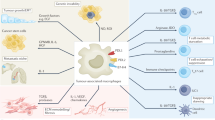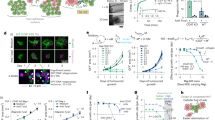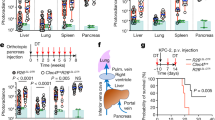Abstract
The in vitro interaction between activated, non-immune macrophages (AM) and a variety of syngeneic, allogeneic or xenogeneic “normal” and “malignant” target cell lines was followed by different parameters such as target cell proliferation, viability or morphology.
Proliferation of all rapidly replicating cell lines examined, irrespective of whether they were of syngeneic, allogeneic or xenogeneic origin, or showed normal or neoplastic growth characteristics, was similarly blocked by the presence of AM in an effector/target cell ratio of 10:1. It was only in very slowly proliferating cells that this inhibitory effect was not detectable. A marked diminution in target cell proliferation was also achieved with target cells growing in suspension, where maintenance of close contact between effectors and targets is unlikely, indicating that this macrophage effect may be mediated by a soluble product of AM.
The finding of clear differences in the proliferation inhibition of slowly proliferating normal and neoplastic targets suggested that proliferation per se may not fully mirror the consequences of the macrophage/target cell interaction. This was affirmed when viability and morphology were used as parameters: viability was virtually unaffected in normal targets whereas neoplastic cells were killed.
Accordingly, it is suggested that activated non-immune macrophages can affect targets in strikingly different ways. Inhibition of proliferation could be an important homoeostatic regulatory function of the macrophage which would affect every replicating cell. Cytocidal killing of targets, on the other hand, is achieved only on neoplastic cells.
This is a preview of subscription content, access via your institution
Access options
Subscribe to this journal
Receive 24 print issues and online access
We are sorry, but there is no personal subscription option available for your country.
Buy this article
- Purchase on Springer Link
- Instant access to full article PDF
Prices may be subject to local taxes which are calculated during checkout
Similar content being viewed by others
Rights and permissions
About this article
Cite this article
Keller, R. Modulation of Cell Proliferation by Macrophages: A Possible Function Apart from Cytotoxic Tumour Rejection. Br J Cancer 30, 401–415 (1974). https://doi.org/10.1038/bjc.1974.214
Issue Date:
DOI: https://doi.org/10.1038/bjc.1974.214



